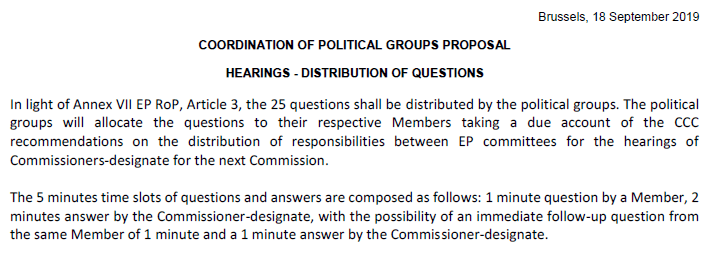It’s almost over now, but in the past months, we’ve been treated to the Brussels “spectacle” of Commissioner-designate hearings.
Margaret Thatcher is said to have called the European Parliament a “Mickey Mouse parliament”. One of the cafés in its labyrinth of buildings and bridges is colloquially called the Mickey Mouse Bar.
Next to the entrance, there’s a painting by a Latvian artist of a Mickey Mouse in a birch forest with a description saying this is a reaction to Prime Minister Thatcher’s quote. Unfortunately, she never said these words – however fitting they are.
One of the many manifestations of the Mickey-Mouse-ness of the European Parliament is the hearings of soon-to-be Commissioners before the European Parliament’s committees. For reasons unknown, these hearings are known in the Brussels bubble as “grilling”. If you tried to grill a steak like this, it wouldn’t be enough even for an extra-rare. See for yourselves.
Every Member of the European Parliament (MEP) is given a five-minute slot. The time distribution of these five minutes is also given: An MEP can ask a question that is maximum one minute long.
Then, the Commissioner gives a platitudinous two-minute answer. After that, the MEP can ask a follow-up question not longer than one minute and the Commissioner is given one last minute for platitudes.
 The European Parliament likes to compare itself to the US Congress. There is a rather significant difference, however. Let’s look for example at the hearing of Bill Barr, nominated by President Trump for Attorney General:
The European Parliament likes to compare itself to the US Congress. There is a rather significant difference, however. Let’s look for example at the hearing of Bill Barr, nominated by President Trump for Attorney General:
Now, let us compare it with the hearing of Commissioner-not-to-be Sylvie Goulard, nominated for the internal market portfolio:
If you managed not to fall asleep in the course of this “grilling”, you can clearly see the difference between the two approaches.
In the United States, the Senator is the master of their time, they can interrupt the nominee and ask follow-up questions quickly (some others use their time for a long speech, not asking the nominee anything), and the voter can learn something about the nominee.
Many a nominee came to regret their words, as lying to the Congress is illegal.
During European Parliament hearings, you will only ever hear platitudes and tired tropes that you can hear at every plenary sitting and every committee sitting: “I thank the Commission for its ambitious proposal but I wish it complemented this proposal with another one that would take the matter even further. Millions of people all across Europe rely on the European Commission continuing to do a great job.” You will hear the same speech every day many times.
This “grilling” is so fake that even the EU bubble press is making fun of it. And if you were an MEP, would it occur to you that it was a good idea to do selfies with the “grilled” Commissioner?
Hearings, even outside the grilling season, are done in a similar fashion. When a committee invites a guest for an “exchange of views”, the way it is handled in the committee is by and large the same. MEPs are lectured by the Committee Chair how to use their five-minute slot and how to ask a question. It’s actually pretty farcical.
And if it occasionally happens that MEPs don’t get what they desire, i.e. unquestioning praise of the European Commission to high heavens, they ask the same question over and over like a broken record.
The hearing of Google and Facebook representatives (starts around the 17:15 mark) or a FIFA representative are good examples. (Both videos for cynics only.)
Theefore, unless a Commissioner says something memorable like Věra Jourová five years ago: “It is also a big problem for a woman at a time when she gets into the so-called ‘sandwich situation’”, then you don’t have to worry one bit that you rather watched The Lord of the Rings or indeed The Time of our Lives.
If you manage to sail through the hearing with enough platitudes to appease MEPs, you can chillax for the next five years, take the 22.000+ euros a month and be merry.
We can only conclude by saying that Brussels is a lot better at frying the Belgian fries than at grilling Commissioners.



